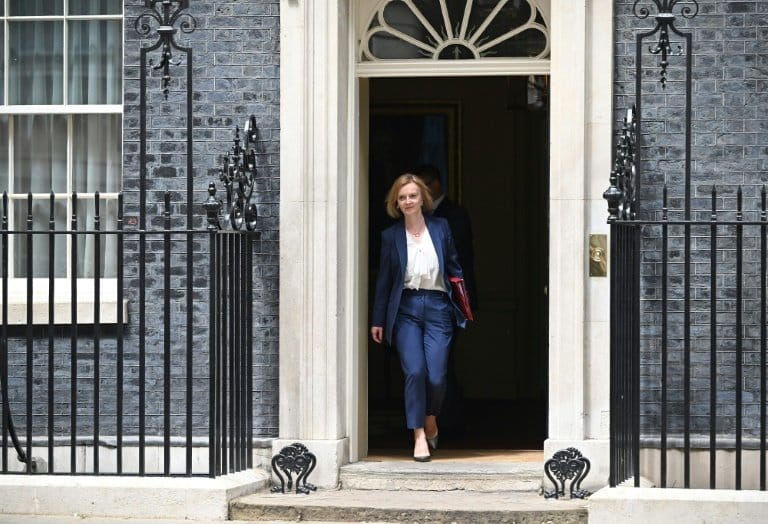Liz Truss becomes Downing Street’s briefest incumbent

Liz Truss is set to become the shortest-serving prime minister in Britain’s history, after the public, MPs and the markets comprehensively rejected the self-styled heir to Margaret Thatcher.
Truss succeeded Boris Johnson by selling to the Conservative rank-and-file a plan to turbo-charge economic growth through tax cuts, via increased borrowing.
She accused her rival in this summer’s Tory leadership race, Rishi Sunak, of “scaremongering” when he warned that such an approach at a time of rampant inflation would drive up interest rates for millions of Britons.
On Thursday, Truss was forced to announce her own resignation, a week after firing her finance minister and “ideological soulmate”, Kwasi Kwarteng, in a desperate bid to shore up her position.
The Tories expect to have a new leader in place by October 28, meaning Truss will comfortably underperform 19th-century leader George Canning, who died in office after serving for 118 days.

Truss dismissed suggestions she consciously copied Margaret Thatcher / © AFP
She is no stranger to screeching U-turns, having begun her political journey as the Liberal Democrat-supporting daughter of progressive parents. At that time, she also opposed the monarchy and Brexit.
Her youthful calls to abolish the royal family ran headlong into her new role when Queen Elizabeth II died on September 8, only two days after appointing Truss.
The new prime minister paid tribute to the late monarch, curtsied to King Charles III, and joined the queen’s successor on a tour of his new UK realms.
But her tribute from the steps of 10 Downing Street was widely seen as stilted, betraying the leaden oratory of Truss in comparison to the verbal theatrics of Johnson.
Yet after scandal-ridden Johnson, Truss’s unvarnished style and promises of a right-wing agenda found favour with the Tory membership.
– ‘Human hand grenade’ –
“She’s always been outspoken. She’s always been a disrupter,” said Mark Littlewood, head of the Institute of Economic Affairs think-tank and a former member of Oxford University’s Liberal Democrat club with Truss.
“You really need to understand Elizabeth Truss as a kind of free-market liberal,” he told AFP when she took power.

Truss confronted Russia’s invasion of Ukraine with characteristic bluntness / © AFP
Truss’s rise to become the UK’s third female prime minister inevitably led to comparisons with the first: Thatcher.
During her year-long stint as foreign minister, Truss was pictured riding atop a tank and sporting a Russian fur hat in Moscow, just like the Tory icon.
Johnson’s former top aide Dominic Cummings likened her to a “human hand grenade”, and some MPs accused her of excessive self-promotion.
Truss admitted to not being the “slickest presenter”. She was mocked online for a bizarre speech she gave as environment minister in 2014, offering impassioned support for British cheese and pork.
– Liberal to Tory –
Truss grew up first in Scotland and then in an affluent suburb of Leeds, northern England.
Her mother was a nurse, teacher and campaigner for nuclear disarmament who took her on protests, and her father was a left-wing maths professor.
During the Tory leadership campaign, Truss criticised her Leeds school for fostering “low expectations”.

Truss once opposed Brexit but now proclaims its economic opportunities / © 10 Downing Street/AFP
That prompted a backlash from teachers, contemporaries and locals who accused her of inventing an “insulting” back-story to curry favour with the Tory right.
Despite the school’s supposed failings, she went on to Oxford, where — like Sunak — she graduated in philosophy, politics and economics.
At Oxford, she was president of the university’s Liberal Democrat branch. At the party’s national conference in 1994, she gave a speech calling for the abolition of the monarchy.
“I was a bit of a teenage controversialist,” Truss admitted during campaigning this summer.
By her own admission, her switch to the Conservatives shocked her parents, but she says her beliefs had evolved.
After university, Truss worked in the energy sector, including for Shell, and telecommunications before entering politics a decade later.

Truss was a Liberal Democrat at university before joining the Conservative party / © AFP
She was a local councillor in southeast London for four years and became an MP in 2010, part of a new generation of women and minority candidates encouraged by then party leader David Cameron.
He quashed protests from the local party in the agricultural South West Norfolk constituency, after it emerged that Truss had been having an extra-marital affair with a fellow Tory.
Her critics were dubbed the “Turnip Taliban”.
Truss’s marriage to an accountant survived the episode, and he stood close by as she made her resignation statement outside 10 Downing Street. They have two daughters.





